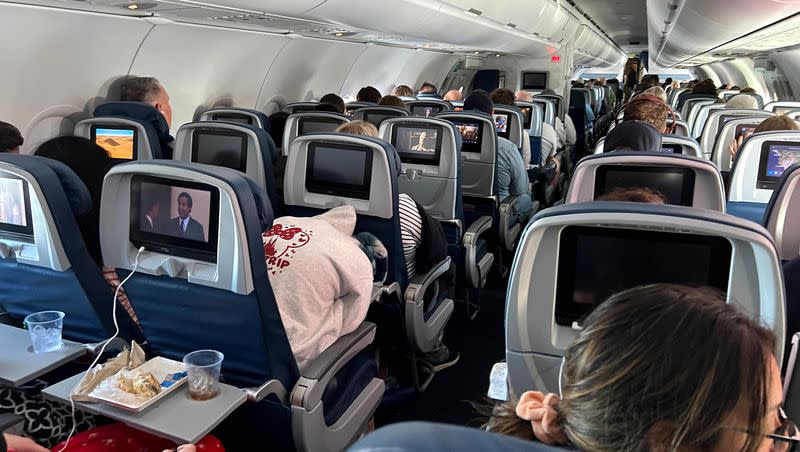At least a dozen maggots fell on a passenger during Delta flight

Tuesday, a passenger on Delta Flight DL133, from Amsterdam to Detroit, said he saw at least a dozen maggots falling on a woman next to him, per Fox 2 Detroit.
“She was freaking out. She was just trying to kind of fight off these maggots,” said Philip Schotte to Fox 2 Detroit, a Netherlands native who lives in Iowa.
He continued, “I don’t really know what was going through my mind. I was trying to process it — disgust is one thing of course. We had to wait there for help to actually come.”
An airline spokesperson verified that the flight “was interrupted due to an improperly packed carry-on bag.” However, no further details were disclosed by the spokesperson regarding the cause of the disruption, according to CBS News.
Schotte, on the other hand, recounted the flight attendants tracing the source of the maggots to a passenger’s bag in the overhead compartments, where they discovered a spoiled fish wrapped in a newspaper.
Once the owner claimed the bag, flight attendants confiscated it, and the pilot announced the return of the flight to Schiphol airport in Amsterdam, per Fox 2 Detroit.
“I did see everyone’s reaction to the bag being opened, which was just an immediate pinching of the nose. I am surprised that both a rotten fish and live maggots were not picked up on by security,” he said.
Customers were placed on the next available flight while the aircraft was removed for cleaning, per USA Today.
Kelce, another passenger onboard the flight, said the airline compensated passengers with 8,000 air miles, hotel compensation and a $30 meal ticket, according to Metro.
Are maggots harmful to humans?
WebMD shares information on maggots and how they affect humans.
Maggots, the larvae of flies, usually inhabit decaying organic material. They are worm-like with small bodies, pointed heads and no limbs.
While they start small, often less than one inch, they can grow in size as they feed. Initially soft and white, they transition to gray or black as they mature, with their bodies hardening over time.
Typically, maggots pose no threat to healthy individuals. However, they can infect human tissue, leading to a condition known as myiasis. Symptoms of myiasis vary depending on the severity and location of the infestation, affecting both humans and animals. If left untreated, myiasis can result in severe health complications, potentially leading to death.
As maggots feed on organic material, they can contaminate food, potentially causing intestinal myiasis. This occurs when flies lay eggs in food, which is then consumed by humans, leading to the hatching of maggots in the intestinal tract and infection.
Maggots do not feed on or bite humans or animals. Therefore, there is no need to worry about them transmitting diseases to you or your pets by accidental touch.
What are the rules regarding carry-on bags?
The Transportation Security Administration’s website notes all of the items and their quantities that are allowed in a carry-on.
For fresh meat and seafood, the TSA says you can bring meat, seafood and solid foods in your carry-on or checked bags. If you pack them with ice or ice packs, the ice must be frozen when you go through screening. If the ice is partially melted and there’s liquid at the bottom of the container, it won’t be allowed. You can also pack frozen perishables in your carry-on or checked bags with up to five pounds of properly packaged and marked dry ice.
According to Ask an Entomologist, many bugs are allowed on flights if properly caged, necessary paperwork is filled out and the bug is not a pest species. For other questions, TSA should be called.
There is no mention of whether maggots or rotten food is allowed on planes. However, one should avoid these items for the safety and comfort of other passengers.
Why didn’t security pick up the rotten fish or maggots?
TSA screeners inspect passengers and their belongings for prohibited items like weapons, chemicals and liquids or foods not allowed as carry-on items.
They utilize screening equipment like metal detectors, millimeter wave machines, backscatter X-ray and cabinet X-ray machines. These devices are designed to identify hidden items as well, according to the U.S. Environmental Protection Agency, or EPA.
Equipment is tested at least once a year to make sure it works and meets federal, state and local safety standards, per the EPA.
As the fish, though rotten, is technically allowed in a carry-on, presumably scanners did not see the fish as a threat. However, there is no word on why maggots were not picked up.
Is there anything else security hasn’t picked up?
While there are no recent incidents, back in 2017, undercover tests revealed TSA screeners had a high failure rate in detecting test weapons. The findings were labeled as “disturbing” by a congressional committee chairman, according to NBC News.
In 2015, Melvin Carraway, who was serving as the acting head of the TSA at the time, was reassigned following an internal investigation by the Department of Homeland Security. Ninety-five percent of all test items sent through screeners, such as weapons and fake explosives, were not detected at busy airports across the nation, per NBC News.
TSA has since updated scanners and has intercepted a record number of firearms, causing the penalty to rise to $14,950, according to the TSA website.

